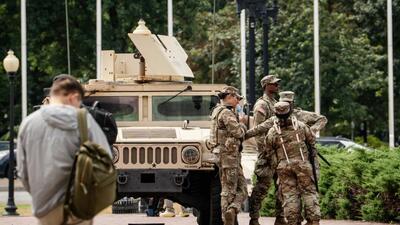
| Published August 16, 2025
Trump’s Federal Takeover of D.C. Police Sparks Legal Battles and National Debate
President Donald Trump’s recent federalization of Washington, D.C.’s Metropolitan Police Department (MPD) has ignited legal and political controversy, raising questions about federal authority, local governance, and potential applications in other major U.S. cities.
Legal Challenge in D.C.
On August 15, 2025, D.C. Attorney General Brian Schwalb filed a lawsuit against the Trump administration, calling the federal takeover “brazenly unlawful.” The lawsuit challenges the appointment of DEA Administrator Terry Cole as “emergency police commissioner,” arguing it exceeds authority under the D.C. Home Rule Act. The Act allows federal intervention in emergencies but limits such actions to 30 days without congressional approval. The lawsuit seeks to restore local control over the MPD and prevent future federal overreach.
National Implications
Trump has suggested similar interventions could extend to other cities, including New York. Legal experts warn that such moves would face constitutional challenges. Unlike D.C., cities within states cannot be federally commandeered without state consent or a legitimate federal emergency. Laws such as the Posse Comitatus Act restrict the use of federal military forces for domestic law enforcement, meaning deploying National Guard troops without state cooperation could be unconstitutional.
Political Reactions
In D.C., Mayor Muriel Bowser has cautiously opposed the federal takeover while trying to protect residents and maintain some cooperation. In New York, mayoral candidate Zohran Mamdani has criticized federal intervention, framing it as an attack on progressive city governance, though opponents argue such confrontations could threaten federal funding for city services.
Right-Leaning Perspective
Supporters of Trump’s actions see the federalization as a decisive law-and-order measure, holding local governments accountable and demonstrating the federal government’s willingness to act where local leadership has failed. The move appeals to voters frustrated by urban crime and progressive policies, portraying federal authority as a tool to restore safety and order.

RGB., CC BY 2.0 via Wikimedia Commons
 Implications
Implications
-
Strong Law-and-Order Messaging
-
The move appeals to voters who prioritize strict crime control and federal intervention in cities perceived as having ineffective local policing.
-
It reinforces the narrative that the federal government can step in where local governments are “soft” on crime.
-
-
Expansion of Executive Authority
-
Supports the idea that a strong executive branch can act decisively in crises, which resonates with voters favoring robust presidential action over bureaucratic constraints.
-
Positions Trump as willing to use federal powers aggressively to “restore order.”
-
-
Challenging Progressive Local Leadership
-
By targeting D.C. (run by Democrats) and proposing interventions in cities like New York, the strategy frames local progressive officials as obstructive or weak on safety.
-
Creates a political contrast between federal assertiveness and local government inefficacy, energizing conservative and moderate voters frustrated with urban crime rates.
-
-
Federal-State Tension as a Political Tool
-
Highlights conflicts between federal authority and state-controlled cities, which may be leveraged in campaigns to criticize Democratic leadership and promote nationalized policies.
-
Positions Trump as a national “enforcer” against what right-leaning supporters may perceive as lawlessness in liberal strongholds.
-
-
Media Narrative & Cultural Appeal
-
Coverage of “hostile takeovers” of city governance feeds into a right-leaning media frame emphasizing chaos in liberal-run cities.
-
Reinforces messaging that conservative policies prioritize safety and accountability over political correctness or local autonomy.
-
 Overall Takeaway:
Overall Takeaway:
Trump’s federalization of D.C.’s police force underscores a decisive, law-and-order approach that challenges ineffective local governance and prioritizes public safety. While critics frame it as federal overreach, supporters see it as a necessary assertion of executive authority in cities where local leadership has failed to curb crime. The move sends a clear message: the federal government will step in to restore order and hold local officials accountable, reinforcing a strong, action-oriented vision that resonates with voters frustrated by urban lawlessness. As similar proposals surface for cities like New York, the strategy highlights the contrast between federal decisiveness and progressive inaction, energizing conservative voters and reshaping the national debate on governance and public safety.





Be the first to comment